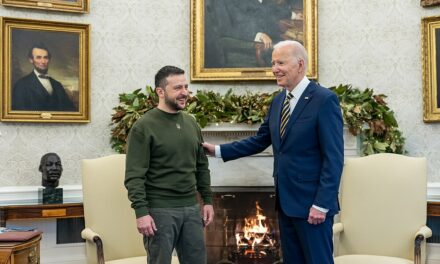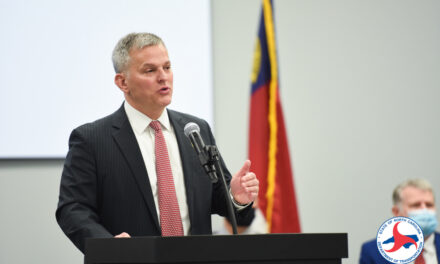We support our Publishers and Content Creators. You can view this story on their website by CLICKING HERE.
Voters in Maricopa County, Arizona, know all too well the consequences of poor election administration.
During the 2022 midterms, ballot on-demand printers at roughly 30 percent of Maricopa’s vote centers produced ballots that did not comport with the vote tabulators. As The Federalist previously reported, the conundrum resulted in long lines and an untold number of voters unable to cast their ballots or have them counted.
[READ: Poll Worker Gives An Inside Look At ‘Complete Chaos’ In Maricopa County On Election Day]
Now, with Election Day rapidly approaching, concerns are once again growing about the administration of the 2024 contest in Arizona’s most populous county, where roughly 62 percent of the population resides. Last week, Maricopa County election officials reportedly warned it could take nearly two weeks before all ballots are counted and finalized. Those comments came a month after officials telegraphed there could be delays and long lines at Election Day vote centers due to issues with ballot tabulators.
With so much at stake this election, Arizona Republicans are leaving nothing to chance. To avoid a 2022 repeat, they’re making a major push for GOP voters to cast their ballots early and ensure their voices are heard at the ballot box this November.
“We’ve done all the litigation we can do ahead of time, and now I have to hope that I can get most of my people to vote early, so that the lines are not that long [and] nobody’s discouraged” to vote, Arizona GOP Chair Gina Swoboda told The Federalist.
Problems on the Horizon?
Worries about potential Election Day problems in Maricopa County are hardly unfounded. As previously indicated, the county’s own officials have publicly sounded the alarm about tabulator issues unfolding that could disenfranchise lawful voters.
According to the Associated Press, Maricopa County Elections Director Scott Jarrett reportedly “warned” last month that vote tabulators “could jam in Maricopa County because voters will have to insert two sheets of paper instead of one when casting their ballots.” The unusually long ballot will include a large number of races and ballot initiatives to be decided by Arizona voters this fall.
Swoboda told The Federalist it will likely take voters a “very long time to fill out” the extensive ballot, which could lead to “long lines” at vote centers. She also expressed concerns about tabulators jamming on Election Day and the impact it could have on inadvertently suppressing likely Republican voters.
“I have this [two-page, doubled-sided] ballot … and I have long lines just by nature of the fact that there’s a long ballot and people are taking time to fill it out. … [If we start getting] paper jams, I’m very concerned that will look very similar to what happened in 2022 in Maricopa County,” Swoboda said. “If my voters come out of there and start [claiming], ‘They’re stealing it. It’s damning. The lines are too long,’ and people start to push that out on social media, I have a huge concern that we will inadvertently suppress our own voters.”
The Arizona GOP chair noted that paper jams previously popped up during Arizona’s 2024 primary elections earlier this year when there were only one-page ballots.
Mark Sonnenklar, a lawyer and Maricopa County precinct committeeman, detailed his experiences as a roving attorney in Maricopa during the July primary in the pages of The American Spectator last month. Among the issues he documented was “a tabulator paper-jam problem at multiple polling centers,” which he warned “could wreak havoc during the upcoming general election.”
Sonnenklar told The Federalist he “found a paper-jam issue at two of [his] 10 vote centers,” and that the “significant problem” resulted in tabulators being “shut down.”
“If this happens [in the general election], the vote centers are going to be operating on [fewer tabulators], which is a huge problem when you have a two-page ballot,” he said.
In August, Maricopa County settled a lawsuit filed by Swoboda, which, as described by local media, “did not properly conduct tests of vote tabulation equipment as required by state law.” The Republican Party of Arizona also claimed that under the last two secretaries of state, only “backup” tabulator machines underwent logic and accuracy testing. The settlement reached between the Arizona Republicans and the county officials in August specified that the Maricopa County Board of Supervisors “shall provide only its tabulators and accessible voting devices that [it] intends to deploy to early voting locations and election day vote centers” for logic and accuracy testing “before an election.”
All Arizona counties — including Maricopa — passed logic and accuracy machine tests overseen by the secretary of state earlier this month, according to local media.
Greater GOP Oversight
The potential for Election Day chaos has prompted Arizona Republicans to undertake greater oversight of the 2024 contest to ensure voters aren’t disenfranchised due to faulty election administration.
Swoboda told The Federalist she will be in the Republican “war room” on Election Day with GOP lawyers, fielding calls from the party’s “record number” of poll observers for any issues that pop up at vote centers across the state. At the “first sign” of paper jams and long lines, the GOP will seek immediate court action to ensure polling sites are kept open longer, she said.
“If it’s 7:30 in the morning, I’ve got long lines and paper jams … happening, I am going to court, and I’m asking them to keep the polls open late,” Swoboda said. “If [a court] wants to do what they did in 2022 and disenfranchise voters by letting us have very long lines and not [keeping the polls] open [longer], then that’s on the judicial system. But I’m not going to wait.”
The Arizona GOP chair also unveiled plans for a Republican rapid response team, which will be comprised of volunteers deployed throughout Maricopa County. According to Swoboda, these individuals will be sent near vote centers with reported issues to notify voters of problems at that center and help them find a nearby voting location where they can cast their ballot more quickly.
“If I get a report that a vote center’s down or the lines are very long, I am going to reach out to my rapid response coordinator, and she is going to contact the volunteers that are designated in the area of that vote center,” Swoboda said. These volunteers are “going to stand at the 75-foot line, which is the line we are allowed to electioneer, and notify the voters, ‘Hey, the vote center down the street has a shorter line [and doesn’t have] any paper jams,’ … so that we don’t get people who just walk away [and don’t vote].”
Swoboda underscored that these individuals will not be “policing” the lines and emphasized that their roles will be strictly informative and in compliance with state law.
Maricopa County GOP Vice Chair Shelby Busch told The Federalist the local party will similarly have a “hotline” that will be staffed “throughout the entire election process.” The hotline is available for election workers, poll observers, and voters “to report issues [and] concerns,” and will allow the GOP to assist these individuals with any reported problems.
Busch also noted the Maricopa County Republican Party has sent out “educational pamphlets with canvassers” and brochures to voters “explaining some of the potential issues that they may face, how to report it, and what to do if they face certain challenges [on Election Day].”
Early Vote Like There’s No Tomorrow
While preparing themselves for any potential Election Day problems in Maricopa and other counties, Arizona conservatives are adamant that the best way voters can avoid such issues is to vote early.
Speaking with The Federalist, Arizona Free Enterprise Club President Scot Mussi said he believes the number of vote centers provided by Maricopa County officials is “inadequate to what’s going to be needed to meet the demand on Election Day,” and encouraged voters who’ve received their early ballot to fill it out and return it “by this Friday … so they can be processed and tabulated for Election Day.”
“Everybody’s saying the same thing: Get your ballot in [early],” Mussi said. “We want to make sure that nobody’s encountering what happened in 2022. … We don’t want to see people walking out of line because it’s taken hours for [them] to vote and deal with issues that might be encountered with the tabulators.”
Swoboda similarly encouraged electors to “please, please, please vote early.”
The deadline to vote early in-person in Arizona is Friday, Nov. 1. For information on Arizona’s voting procedures and deadlines, check out The Federalist’s 2024 Battleground State Election Guide.
For more election news and updates, visit electionbriefing.com.
Shawn Fleetwood is a staff writer for The Federalist and a graduate of the University of Mary Washington. He previously served as a state content writer for Convention of States Action and his work has been featured in numerous outlets, including RealClearPolitics, RealClearHealth, and Conservative Review. Follow him on Twitter @ShawnFleetwood

 Conservative
Conservative  Search
Search Trending
Trending Current News
Current News 





